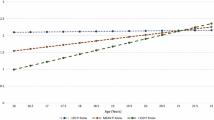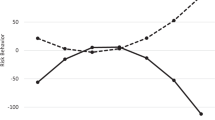Abstract
The purpose of this study was to gain a clearer understanding of the relation between parents’ knowledge of their emerging-adult children and emerging adults’ risk behaviors. Participants included 200 undergraduate students between the ages of 18 and 25 (121 women, 78 men; M age = 19.59, SD = 1.62) and both of their parents. Results revealed that knowledge of the emerging-adult child’s activities varied as a function of parent- and child-reports, and that child outcomes associated with parental knowledge were generally positive, including less drinking, drug use, and risky sexual behavior (although this varied as a function of reporter). The links between maternal knowledge and lower drug and alcohol use were particularly strong in the presence of maternal closeness. Implications for understanding the parent–child relationship during the transition to adulthood were discussed.


Similar content being viewed by others
References
Aiken, L. S., & West, S. G. (1991). Multiple regression: Testing and interpreting interactions. Newbury Park: Sage.
Allen, J., & McElhaney, K. (2000). Autonomy in discussion vs. autonomy in decision making as predictors of develo** close friendship competence. Paper presented at the biennial meeting of the Society for Research on Adolescence, Chicago, IL.
Arnett, J. J. (2000). Emerging adulthood: A theory of development from the late teens through the twenties. American Psychologist, 55, 469–480.
Arnett, J. J. (2004). Emerging adulthood: The winding road from the late teens through the twenties. NY: Oxford Press.
Arnett, J. J. (2005). The developmental context of substance use in emerging adulthood. Journal of Drug Issues, 35, 235–253.
Arnett, J. J. (2006). Emerging adulthood: Understanding the new way of coming of age. In J. J. Arnett & J. L. Tanner (Eds.), Emerging adults in America: Coming of age in the 21st century (pp. 3–20). Washington, D.C.: American Psychological Association.
Arnett, J. J. (2007). Suffering, selfish, slackers? Myths and reality about emerging adults. Journal of Youth and Adolescence, 36, 23–29.
Aquilino, W. S. (2006). Family relationships and support systems in emerging adulthood. In J. J. Arnett & J. L. Tanner (Eds.), Emerging adults in America: Coming of age in the 21st century (pp. 193–218). Washington, D.C.: American Psychological Association.
Badger, S., Nelson, L. J., & Barry, C. M. (2006). Perceptions of the transition to adulthood among Chinese and American emerging adults. International Journal of Behavioral Development, 30, 84–93.
Barber, B. K., Olsen, J. E., & Shagle, S. C. (1994). Associations between parental psychological and behavioral control and youth internalized and externalized behaviors. Child Development, 65, 1120–1138.
Barker, E. T., Bornstein, M. H., Putnick, D. L., Hendricks, C., & Suwalsky, J. T. D. (2007). Adolescent-mother agreement about adolescent problem behaviors: Direction and predictors of disagreement. Journal of Youth and Adolescence, 36, 950–962.
Barnes, G. M., Hoffman, J. H., Welte, J. W., Farrell, M. P., & Dintcheff, B. A. (2006). Effects of parental monitoring and peer deviance on substance use and delinquency. Journal of Marriage and Family, 68, 1084–1104.
Barry, C. M., Padilla-Walker, L. M., Madsen, S. D., & Nelson, L. J. (in press). The impact of maternal relationship quality on emerging adults’ prosocial tendencies: Indirect effects via regulation of prosocial values. Journal of Youth and Adolescence.
Bartle-Haring, S., Brucker, P., & Hock, E. (2002). The impact of parental separation anxiety on identity development in late adolescence and early adulthood. Journal of Adolescent Research, 17, 439–450.
Bean, R. A., Barber, B. K., & Crane, D. R. (2006). Parental support, behavioral control, and psychological control among African American youth: The relationships to academic grades, delinquency, and depression. Journal of Family Issues, 27, 1335–1355.
Buchanan, C. M., Maccoby, E. E., & Dornbusch, S. M. (1991). Caught between parents: Adolescents’ experience in divorced homes. Child Development, 62, 1008–1029.
Coll, C. G., & Pachter, L. M. (2002). Ethnic and minority parenting. In M. H. Bornstein (Ed.), Handbook of parenting: Vol. 4: Social conditions and applied parenting (2nd ed., pp. 1–20). Mahwah, NJ: Lawrence Erlbaum Associates.
Côté, J. E. (2000). Arrested adulthood: The changing nature of maturity and identity. New York: New York University Press.
Crouter, A. C., & Head, M. R. (2002). Parental monitoring and knowledge of children. In M. H. Bornstein (Ed.), Handbook of parenting: Vol. 3: Being and becoming a parent (2nd ed., pp. 461–484). Mahwah, NJ: Lawrence Erlbaum Associates.
Crouter, A. C., Helms-Erikson, H., Updegraff, K., & McHale, S. M. (1999). Conditions underlying parents’ knowledge about children’s daily lives in middle childhood: Between- and within-family comparisons. Child Development, 70, 246–259.
Darling, N., & Steinberg, L. (1993). Parenting style as a context: An integrative model. Psychological Bulletin, 113, 487–496.
Dishion, T. J., & McMahon, R. J. (1998). Parental monitoring and the prevention of child and adolescent problem behavior: A conceptual and empirical formulation. Clinical Child and Family Psychology Review, 1, 61–75.
Dubas, J. S., & Petersen, A. C. (1996). Geographical distance from parents and adjustment during adolescence and young adulthood. New Directions for Child Development, 71, 3–19.
Edwards, C. P., & Liu, W. (2002). Parenting toddlers. In M. H. Bornstein (Ed.), Handbook of parenting: Vol. 1: Children and parenting (2nd ed., pp. 45–72). Mahwah, NJ: Lawrence Erlbaum Associates.
Feiring, C., & Lewis, M. (1993). Do mothers know their teenagers’ friends? Implications for individuation in early adolescence. Journal of Youth and Adolescence, 22, 337–354.
Fischer, J. L., Forthun, L. F., Pidcock, B. W., & Dowd, D. A. (2007). Parent relationships, emotional regulation, psychosocial maturity, and college student alcohol use problems. Journal of Youth and Adolescence, 36, 912–926.
Glasgow, K. L., Dornbusch, S. M., Troyer, L., Steinberg, L., & Ritter, P. L. (1997). Parenting styles, adolescents’ attributions, and educational outcomes in nine heterogeneous high schools. Child Development, 68, 507–529.
Guo, J., Chung, I. J., Hill, K. G., Hawkins, J. D., Catalano, R. F., & Abbott, R. D. (2002). Developmental relationships between adolescent substance use and risky sexual behavior in young adulthood. Journal of Adolescent Health, 31, 354–362.
Keniston, K. (1971). Youth and dissent: The rise of a new opposition. New York: Harcourt Brace Jovanovich.
Kenny, M. E., & Sirin, S. R. (2006). Parental attachment, self-worth, and depressive symptoms among emerging adults. Journal of Counseling & Development, 84, 61–71.
Kerr, M., & Stattin, H. (2000). What parents know, how they know it, and several forms of adolescent adjustment: Further support for a reinterpretation of monitoring. Development Psychology, 36, 366–380.
Lefkowitz, E. S. (2005). “Things have gotten better:” Developmental changes among emerging adults after the transition to university. Journal of Adolescent Research, 20, 40–63.
Lefkowitz, E. S., & Gillen, M. M. (2006). “Sex is just a normal part of life”: Sexuality in emerging adulthood. Emerging adults in America: Coming of age in the 21st century (pp. 235–256). Washington, D.C.: American Psychological Association.
Longmore, M. A., Manning, W. D., & Giordano, P. C. (2001). Preadolescent parenting strategies and teens’ dating and sexual initiation: A longitudinal analysis. Journal of Marriage and the Family, 63, 322–335.
Maccoby, E. E. (1992). The role of parents in the socialization of children: A historical overview. Developmental Psychology, 1006–1017.
Nelson, L. J., & Barry, C. M. (2005). Distinguishing features of emerging adulthood: The role of self-classification as an adult. Journal of Adolescent Research, 20, 242–262.
Nelson, L. J., Padilla-Walker, L. M., Carroll, J. S., Madsen, S., Barry, C. M., & Badger, S. (2007). ‘If you want me to treat you like an adult, start acting like one!’ Comparing the criteria for adulthood among emerging adults and their parents. Journal of Family Psychology, 21, 665–674.
O’Connor, T. G., Allen, J. P., Bell, K. L., & Hauser, S. T. (1996). Adolescent-parent relationships and leaving home in young adulthood. New Directions for Child Development, 71, 39–52.
Pettit, G. S., Laird, R. E., Dodge, K. A., Bates, J. E., & Criss, M. M. (2001). Antecedents and behavior-problem outcomes of parental monitoring and psychological control in early adolescence. Child Development, 72, 583–598.
Santelli, J. S., Brener, N. D., Lowry, R., Bhatt, A., & Zabin, L. S. (1998). Multiple sexual partners among U.S. adolescents and young adults. Family Planning Perspectives, 30, 271–275.
Schulenberg, J. E., & Zarrett, N. R. (2006). Mental health during emerging adulthood: Continuity and discontinuity in courses, causes, function. In J. J. Arnett & J. L. Tanner (Eds.), Emerging adults in America: Coming of age in the 21st century (pp. 135–172). Washington, DC: American Psychological Association.
Stattin, H., & Kerr, M. (2000). Parental monitoring: A reinterpretation. Child Development, 71, 1072–1085.
Steinberg, L. (1990). Autonomy, conflict, and harmony in the family relationship. In S. Feldman & G. Elliott (Eds.), At the threshold: The develo** adolescent (pp. 255–276). Cambridge: Harvard University Press.
Steinberg, L. (2001). We know some things: Parent-adolescent relationships in retrospect and prospect. Journal of Research on Adolescence, 11, 1–19.
Steinberg, L., & Silk, J. S. (2002). Parenting adolescents. In M. H. Bornstein (Ed.), Handbook of parenting: Vol. 1: Children and parenting (2nd ed., pp. 103–133). Mahwah, NJ: Lawrence Erlbaum Associates.
Strom, P. S., & Strom, R. (2005). Parent-child relationships in early adulthood: College students living at home. Community College Journal of Research and Practice, 29, 517–529.
Tragesser, S. L., Beauvais, F., Swaim, R. C., Edwards, R. W., & Oetting, E. R. (2007). Parental monitoring, peer drug involvement, and marijuana use across three ethnicities. Journal of Cross-Cultural Psychology, 38, 670–694.
Zarit, S. H., & Eggebeen, D. J., (2002). Parent-child relationships in adulthood, later years. In M. H. Bornstein (Ed.), Handbook of parenting: Vol. 1: Children and parenting (2nd ed., pp. 135–161). Mahwah, NJ: Lawrence Erlbaum Associates.
Acknowledgements
The authors express appreciation to the instructors and students at all Project READY data collection sites for their assistance. We also are grateful for the grant support of the Family Studies Center at Brigham Young University, as well as the junior faculty sabbatical grant given to the fourth author by Loyola College in Maryland.
Author information
Authors and Affiliations
Corresponding author
Rights and permissions
About this article
Cite this article
Padilla-Walker, L.M., Nelson, L.J., Madsen, S.D. et al. The Role of Perceived Parental Knowledge on Emerging Adults’ Risk Behaviors. J Youth Adolescence 37, 847–859 (2008). https://doi.org/10.1007/s10964-007-9268-1
Received:
Accepted:
Published:
Issue Date:
DOI: https://doi.org/10.1007/s10964-007-9268-1




